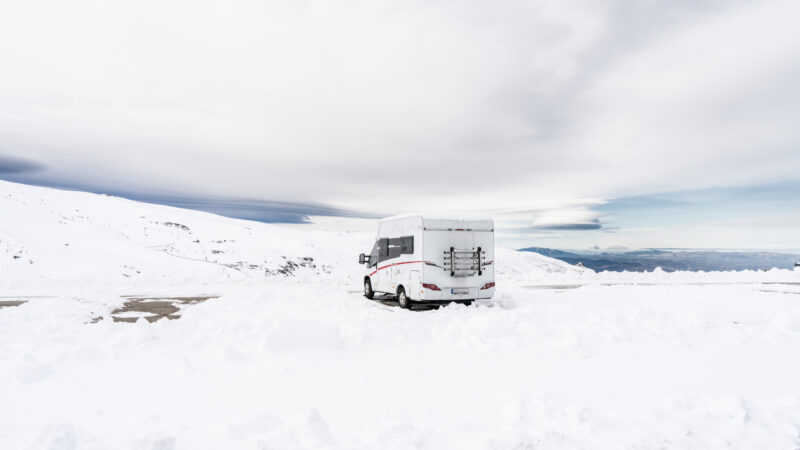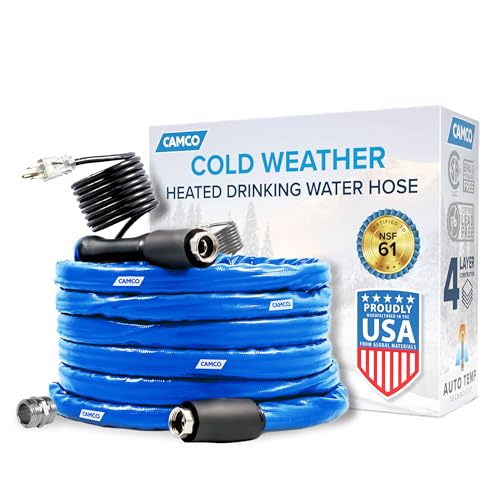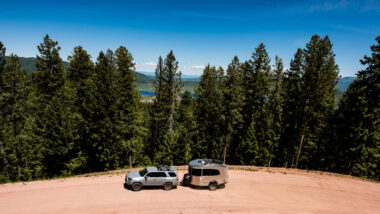Table of Contents Show
No matter what time of year you go camping, it can be challenging. However, winter RV camping is an entirely different ballgame.
If you don’t take the time to prepare yourself and your RV, it can be a dangerous and costly experience.
If you’re considering braving Old Man Winter this year, you might want to think again.
Today, we’ll share five reasons you should avoid winter RV camping.
Let’s dive in!
Can You Use An RV in Freezing Weather?
It is possible to use an RV in freezing weather. However, the more temperatures drop below freezing, the more dangerous it can be to you and your RV.
Water can freeze in your water lines, which can cause severe damage to your rig.
Some rigs can withstand the elements better than other RVs, but freezing temperatures are typically not very enjoyable in most RVs.
How Cold Is Too Cold for RV Camping?
The ability of an RV to withstand cold will vary depending on the rig.
For many RVers, 32 degrees Fahrenheit is their tipping point. However, some rigs have tank heaters and furnace vents that run into the RV’s underbelly.
Rigs with these devices can withstand temperatures well below freezing and sub-zero.
RVs are notorious for having poor insulation, so even though they can withstand the temperatures, it will be hard to be comfortable.
Most RV furnaces struggle to combat the cold air, and you’ll likely burn through propane very quickly.
Pipes can begin to freeze and burst the longer the temperatures stay below freezing.
Pro Tip: You’ll want to know how to Protect Your RV From Cold Weather if you are considering braving Old Man Winter!
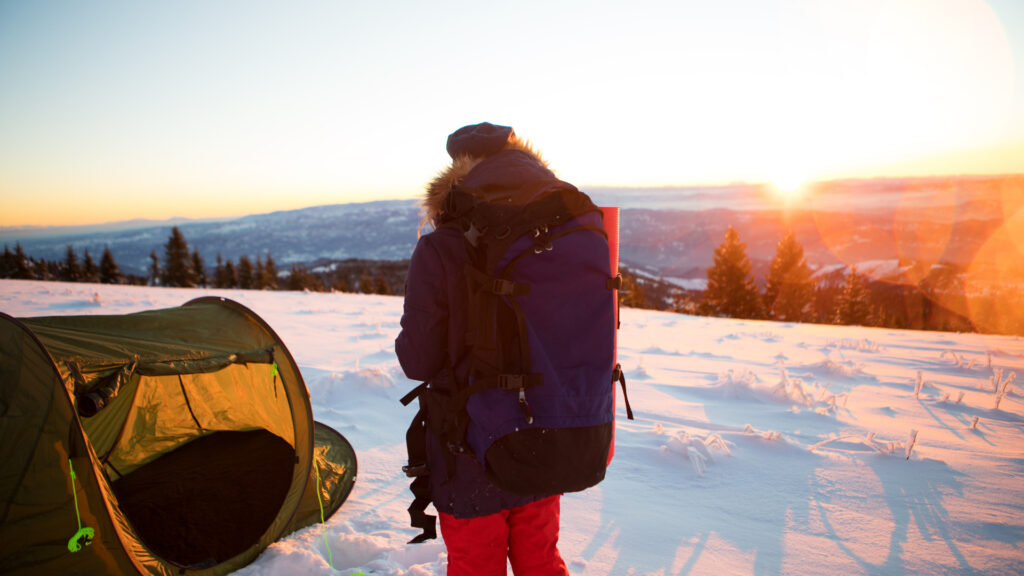
How Cold Does It Have to Be for RV Pipes to Freeze?
Many people worry about RV pipes freezing during winter while camping.
It usually isn’t a big deal if the temperature dips below freezing for a couple of hours.
However, RV pipes tend to freeze when temperatures drop below freezing for approximately 24 hours.
Keeping the inside of your RV warm can help prevent your pipes from freezing, but you can typically only do so much. Manufacturers tend to provide minimal amounts for water lines on some rigs.
You may find that some toilets, showers, or faucets will freeze before others. This is often because they have more exposure to freezing temperatures than others.
If your RV pipes freeze, you’ll likely need to wait until temperatures climb above freezing or the sun shines on them to help them thaw.
Pro Tip: If you think you’ll be dipping into freezing territory, read How to Handle an RV One Night Freeze in Your RV to get prepared!
5 Reasons to Avoid Winter RV Camping
While we love RVing year-round, there are a handful of reasons we think you should avoid winter RV camping.
Many underestimate how incredibly challenging it can be to go RVing in the winter. Consider why you should think twice before booking a campsite during the winter.
1. Even Four Season Campers Can’t Handle Extreme Cold
Your RV dealer may have talked up the four-season rating on your camper, but it’s often not nearly as effective as you might think.
Extreme cold temperatures are often too much for even the most expensive RVs to withstand.
You’ve never experienced a cold floor until you walk across an RV in single-digit wind chills. It’ll freeze you to the bone!
Having a four-season camper doesn’t mean you’ll stay nice and toasty. Rigs with a four-season rating still have to battle frozen water lines and cold floors.
You can do some things to help combat the cold weather, but it’s best to head south or wait until spring for a camping adventure.
Learn More: Read about The Best Four-Season Camper Brands on the Market if you know you’ll need an RV that can take on winter.
2. Many Parks and Attractions Are Closed
Many parks and attractions close during the winter months. This is because they often experience much less traffic, and the costs of staying open aren’t worth it for them as a business.
Many campgrounds and attractions must prepare their facilities to withstand the extreme winter weather conditions to avoid property damage.
This is especially true in northern states that experience extremely harsh winter weather conditions.
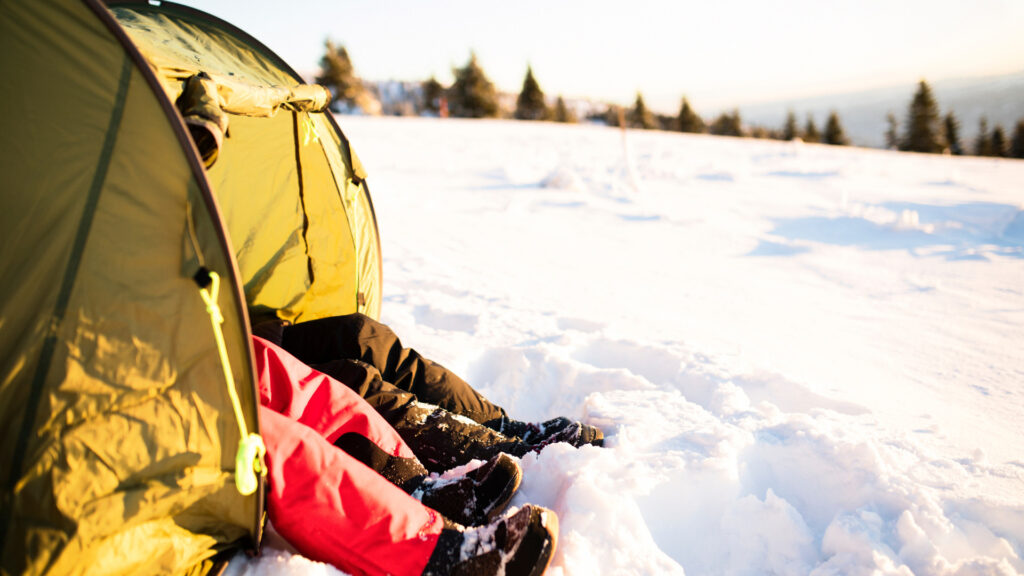
3. Winter Storms Create Dangerous Road Conditions
Traveling in an RV is dangerous, but winter storms can blanket roads with snow and ice. This can create a very hazardous situation that even the most experienced RVers will find too much.
These road conditions can cause you to drastically reduce your speed, making even a short trip take an extremely long time.
If you’re on a winter RV camping trip and the forecast calls for snow or ice, it’s best to hunker down or get out of town ahead of the storm.
You don’t want to have a travel day during a winter storm. No campsite or epic RV adventure is worth gambling with your safety.
Keep in Mind: Some states are fun to visit in the winter, but there are some you’ll want to avoid! These are the Coldest States in the US to skip this winter.
4. Prepping Your RV for Cold Temperatures Can Be Expensive
You can do some things to prepare your RV for cold temperatures, but they’re usually not cheap. RV skirting does an excellent job of keeping the cold air from blowing under your RV, but it’s costly.
It’s also a very time-consuming process to install and take down. You’ll typically only see RV skirting on rigs that will sit stationary for the entire winter season.
If you’re planning winter RV camping, you’d better have a heated water hose, window insulation, and plenty of propane. It’s not uncommon for RVers to blow through propane incredibly quickly.
A standard 30-pound propane tank that lasts most people an entire camping season or more may only last a day or two while camping in the winter.
Depending on the price of propane, you can spend several hundred dollars monthly when heating your RV with propane. It is doable, but it will not be cheap.
5. Time Passes Slower
Time flies when you’re having fun, but sitting inside a tiny RV for weeks or months isn’t all that exciting.
You’ll often be incredibly bored if you’re stuck inside your RV. Even if you bundle up and brave the cold weather, there will likely be fewer activities to enjoy.
You may be in an area with ski slopes or snowshoeing, but if sub-zero temperatures follow massive dumping of fresh snow, you likely won’t want to venture into the cold.
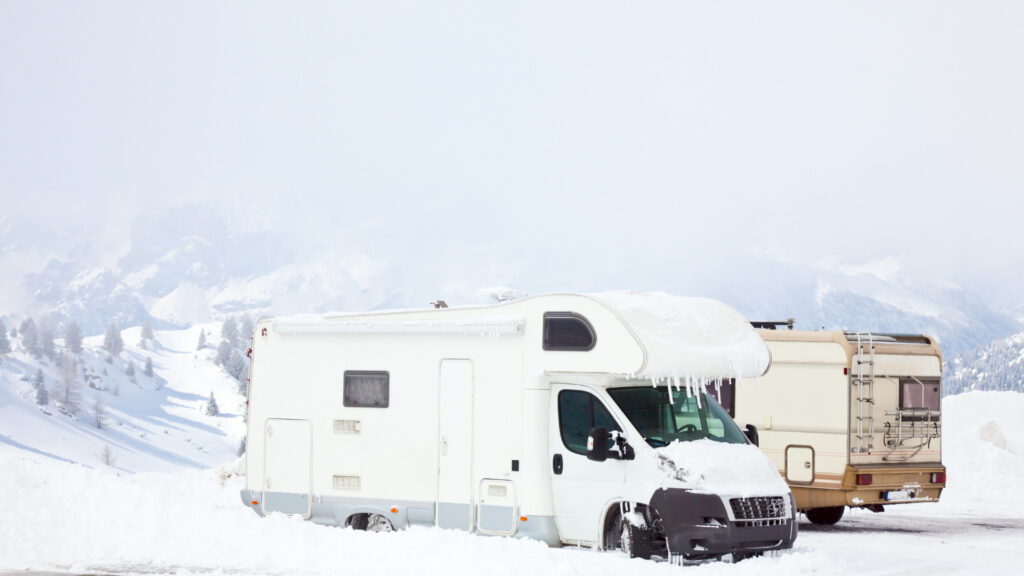
If You Want to RV in the Winter – Do It Right
You don’t want to wing it if you’re going RV camping in winter. You want to prepare yourself and your RV for whatever Mother Nature might throw your way.
If you’re planning to sit stationary for the season, you’ll want to invest in skirting around your RV.
This can be a DIY RV skirting, an expensive custom-made one, or something that will block the wind from blowing under your rig.
A heated RV hose is essential. These special hoses help prevent you from worrying about your water hose freezing in frigid temperatures.
If your hose does freeze, you’ll need to bring it indoors or wait for the temperatures to climb for the ice in the hose to melt.
- PREMIUM GRADE DRINKING WATER HOSE: Camco's RV water hose is constructed with NSF/ANSI 61 certified hose for drinking...
- PROVIDES FREEZE PROTECTION: Receive water line freeze protection down to -20°F (-28°C) with this 25' Camco heated...
Many RVers who attempt to battle winter will purchase or rent a larger propane tank to heat their RV.
Most RVs come with 20-pound or 30-pound propane tanks, which will only last two or three days during extreme weather conditions.
You don’t want constantly running back and forth to have someone fill your propane tanks. It’s a good idea to check your tank levels if several days of cold weather are in the forecast.
Lastly, you’ll want to invest in warm clothes. No matter how expensive your RV is, it will likely still be chilly. An electric blanket may be an excellent option to help you stay warm while sleeping.
Keep in Mind: We have a few more tips about How to Stay Warm in Your RV that you should read up on before winter!
Winter RV Camping: Not for the Faint of Heart
Winter RV camping isn’t easy. Many RVers quickly discover that they’ve bitten off more than they can chew. Winter weather in some parts of the country can be hazardous and unpredictable.
Winter storms can knock out power and cause you to stay at a campsite or location longer than you might have planned. There’s a reason so many RVers head south to Florida or Arizona during the winter months.
You typically don’t hear people in these states complaining about having to shovel the sunshine.
Are you risking a winter RV camping trip this year?
Last update on 2024-07-26 / Affiliate links / Images from Amazon Product Advertising API




